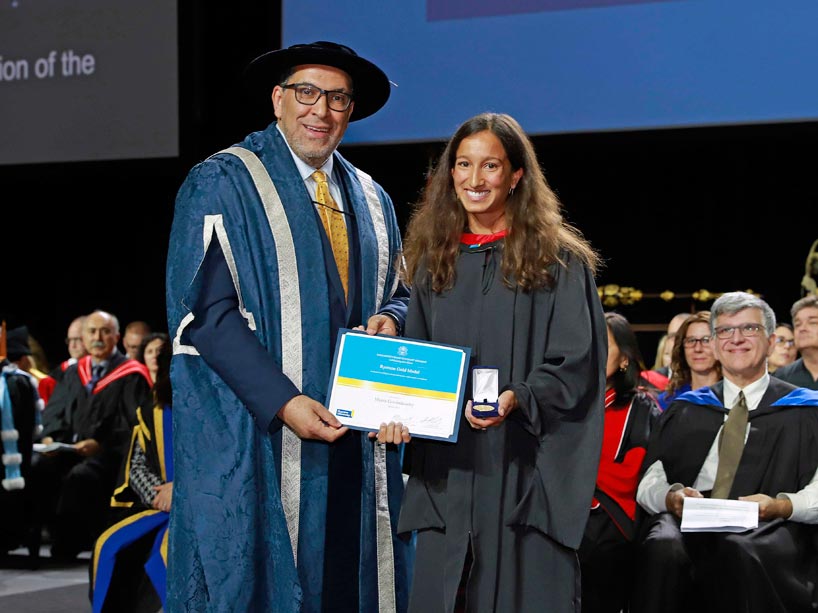Social justice podcaster receives Gold Medal

For her master’s thesis, gold medallist Meera Govindasamy created Rights Bites, a podcast about legal issues faced by newcomers to Canada, which has been downloaded and streamed more than 700 times. Photo: LifeTouch.
Graduating with a master’s of arts in communication and culture, Meera Govindasamy received the Ryerson Gold Medal at the fall 2019 convocation ceremony on Oct. 16.
Govindasamy’s series of podcasts about legal issues faced by newcomers to Canada, created for her thesis, has been downloaded more than 700 times on the Community Legal Education Ontario website, and is being adapted for use in communities across Canada.
The graduate also helped organize events through the Fugitive Spaces – Teaching and Learning Symposium and the Studio for Media Activism and Critical Thought, and served as the equity officer on the Communication and Culture Graduate Students’ Association, among other contributions.
Here, Govindasamy shares her thoughts on receiving the university’s highest honour.
What does receiving the gold medal mean to you?
Receiving the gold medal means a lot to me, particularly given my somewhat non-traditional approach to research. My final project, created with the support of Community Legal Education Ontario, was a legal rights podcast for newcomers called Rights Bites.
The podcast and accompanying ESL lesson plans focus on common housing and employment law problems, and feature the first-hand experiences of newcomers to Canada, as well as conversations with lawyers and community workers. It feels significant to me to have my practical and community-involved project recognized as a valuable academic contribution.
What advice would you give students entering their first year?
Go to the office hours offered by your professors and TAs, spend time with friends, and please come to Writing Support!
Do you have any favourite classes/teachers, and what made them stand out?
I’m grateful for my supervisor, Marusya Bociurkiw. She challenged me to write more creatively and helped me make strong connections between theoretical concepts and the project component of my research.
Additionally, Miranda Campbell and Jennifer Fisher provided insight and support throughout my research and writing process, which extended well beyond their roles as my committee members.
Finally, Colleen Derkatch and Julie Tomiak taught my two favourite courses during my master’s degree. I was always impressed by their critical approach to research, as well as the emphasis they each placed on creating positive and intentional pedagogical experiences for graduate students.
How did Ryerson support you during your time here?
Having the opportunity to work – both leading tutorials for undergraduate students and as a writing consultant at Writing Support – has been invaluable to me. Staff and faculty at Ryerson were always encouraging and helpful to me when I was looking for work opportunities. In particular, the experience I’ve gained through my role at Writing Support has helped solidify my passion for teaching and working with others.
What has been your proudest accomplishment?
Last year I got to present an oral history project created with my grandma about our family’s history of anti-apartheid activism at a conference in Cape Town. It was my first time visiting South Africa, where my dad and grandma are from, and I was really proud to share a piece of our family history with a broader community.
What are your future plans?
I don’t really have a plan right now, but I’m okay with that. At the moment, I’m working at Ryerson as the writing programs developer. In the future, I hope to keep working in education, while finding ways to continue learning, having fun, and participating in activism.
What is your role with the Studio for Media Activism, and why do you think the studio is important?
I’m a member of The Studio for Media Activism and Critical Thought’s Graduate Student Caucus. In my two years working and volunteering with The Studio, I’ve learned from my fellow members about how to organize successful events that bring together activism, media, and critical academic research.
In addition to helping me develop my organizing skills, the work of the studio is important because of the opportunity it creates for like-minded students, faculty, and community members to connect with and support one another.
Most recently, several studio members hosted a South Asian Reading Group as part of this year’s Salon Series. At the event, the discussion about the selected reading transformed seamlessly into a conversation about some of the challenges racialized students experience in university settings. I hope The Studio can provide some relief from that pattern of oppression, while facilitating conversations about what research and education can look like in the future.
